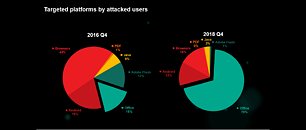Raevenlord
News Editor
- Joined
- Aug 12, 2016
- Messages
- 3,755 (1.19/day)
- Location
- Portugal
| System Name | The Ryzening |
|---|---|
| Processor | AMD Ryzen 9 5900X |
| Motherboard | MSI X570 MAG TOMAHAWK |
| Cooling | Lian Li Galahad 360mm AIO |
| Memory | 32 GB G.Skill Trident Z F4-3733 (4x 8 GB) |
| Video Card(s) | Gigabyte RTX 3070 Ti |
| Storage | Boot: Transcend MTE220S 2TB, Kintson A2000 1TB, Seagate Firewolf Pro 14 TB |
| Display(s) | Acer Nitro VG270UP (1440p 144 Hz IPS) |
| Case | Lian Li O11DX Dynamic White |
| Audio Device(s) | iFi Audio Zen DAC |
| Power Supply | Seasonic Focus+ 750 W |
| Mouse | Cooler Master Masterkeys Lite L |
| Keyboard | Cooler Master Masterkeys Lite L |
| Software | Windows 10 x64 |
Having the world's most pervasive operating system (or office suite) is sure to leave a big mark on any company when it comes to exploitation attempts from hackers. It's a simple equation: aim your efforts at a software that runs in millions (if not billions) of machines and even a light chink in the armor could be enough to cause a cascading effect through that many users.
This principle applies to almost everything: a small effect across a billion users usually provides greater returns than a large effect on one or two players. Kaspersky labs on its security report, presented at the Security Analyst Summit, reported that the favorite target for cyber attacks was Microsoft's Office suite - a 70% figure suggests an incredible attention given to Office, really. These Office-related cyber attacks don't directly relate to the suite itself; there are other, OS-integrated components that can be targeted, or simply that Office file extensions are used as clever, headache-inducing ways of disguising malware as the second greatest evil in the world - spreadsheets.

View at TechPowerUp Main Site
This principle applies to almost everything: a small effect across a billion users usually provides greater returns than a large effect on one or two players. Kaspersky labs on its security report, presented at the Security Analyst Summit, reported that the favorite target for cyber attacks was Microsoft's Office suite - a 70% figure suggests an incredible attention given to Office, really. These Office-related cyber attacks don't directly relate to the suite itself; there are other, OS-integrated components that can be targeted, or simply that Office file extensions are used as clever, headache-inducing ways of disguising malware as the second greatest evil in the world - spreadsheets.

View at TechPowerUp Main Site


